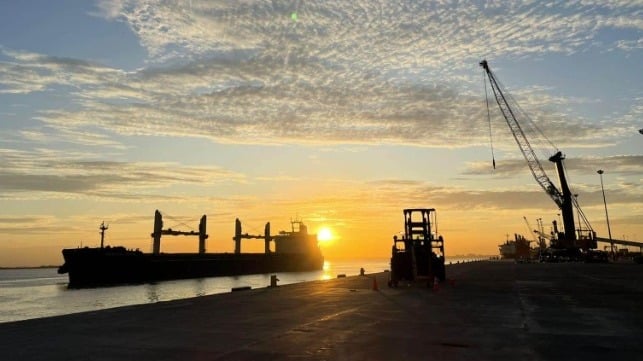Political Unrest Creates Shipping Crisis in Mozambique

The escalating political turmoil in Mozambique is threatening to stall significant port investments in the country. Post-election violence began in October, and has also become a major barrier for Southern Africa regional trade, with frequent border closures. The Maputo Port operator Grindrod confirmed last week that the ongoing protests are taking a major toll on its operations in Mozambique.
As of November 30, protest disruptions had delayed 24 vessels at the Port of Maputo, with six other vessels canceling calls due to stock shortages at the quayside. “With the end of the year approaching, all or a portion of delayed vessels, if not canceled, can only be handled in the New Year,” Grindrod said in a statement to the Johannesburg Stock Exchange platform.
Grindrod further noted that its fourth quarter was the hardest hit, specifically the cargo volumes in the dry-bulk terminals. The Port of Maputo is a critical export gateway for minerals such as chrome and titanium as well as coal. Last month, Grindrod was forced to shut down terminal operations in Maputo and Matola ports. At the time, South Africa’s border authority closed the Lebombo border closing point as violence mounted on the Mozambican side, disrupting truck and rail services.
As a result of the protests, the Mozambican government reported that it has lost $54 million due to disruptions at the Maputo Port.
The breakdown of political governance in Mozambique portends a grim future for one of the potentially wealthy nations in Sub-Saharan Africa. In the past decade, Mozambique has been put on the global LNG map after discovery of large gas reserves. This has attracted over $60 billion in investments from global energy companies, including Total, Exxon Mobil, ENI and China National Petroleum Corporation (CNPC).

that matters most
Get the latest maritime news delivered to your inbox daily.
Unfortunately, an Islamist insurgency in northern Mozambique has seen some of these energy projects halted. At the height of the unrest in 2020, Islamic State-linked fighters captured the port of Mocimboa da Praia, a commercial seaport used by contractors working in the region’s budding offshore gas sector. Now, without a working government in Maputo, the insurgency-prone areas in the northern provinces are at greater risk - not to mention the large-scale energy projects.
But what is even more critical is ensuring that Mozambique’s political challenges do not evolve into a regional maritime security issue. The Mozambique Channel, a long-forgotten global chokepoint in the Indian Ocean, is now a critical shipping route as traffic re-routes from the Suez Canal. In addition, the Channel is regarded as a hydrocarbon hub. The offshore region straddling northeast Mozambique and southeast Tanzania, commonly known as Rovuma Basin, has over 100 trillion cubic feet of recoverable natural gas. For these reasons, it is critical to ensure stable governance in Mozambican waters.
